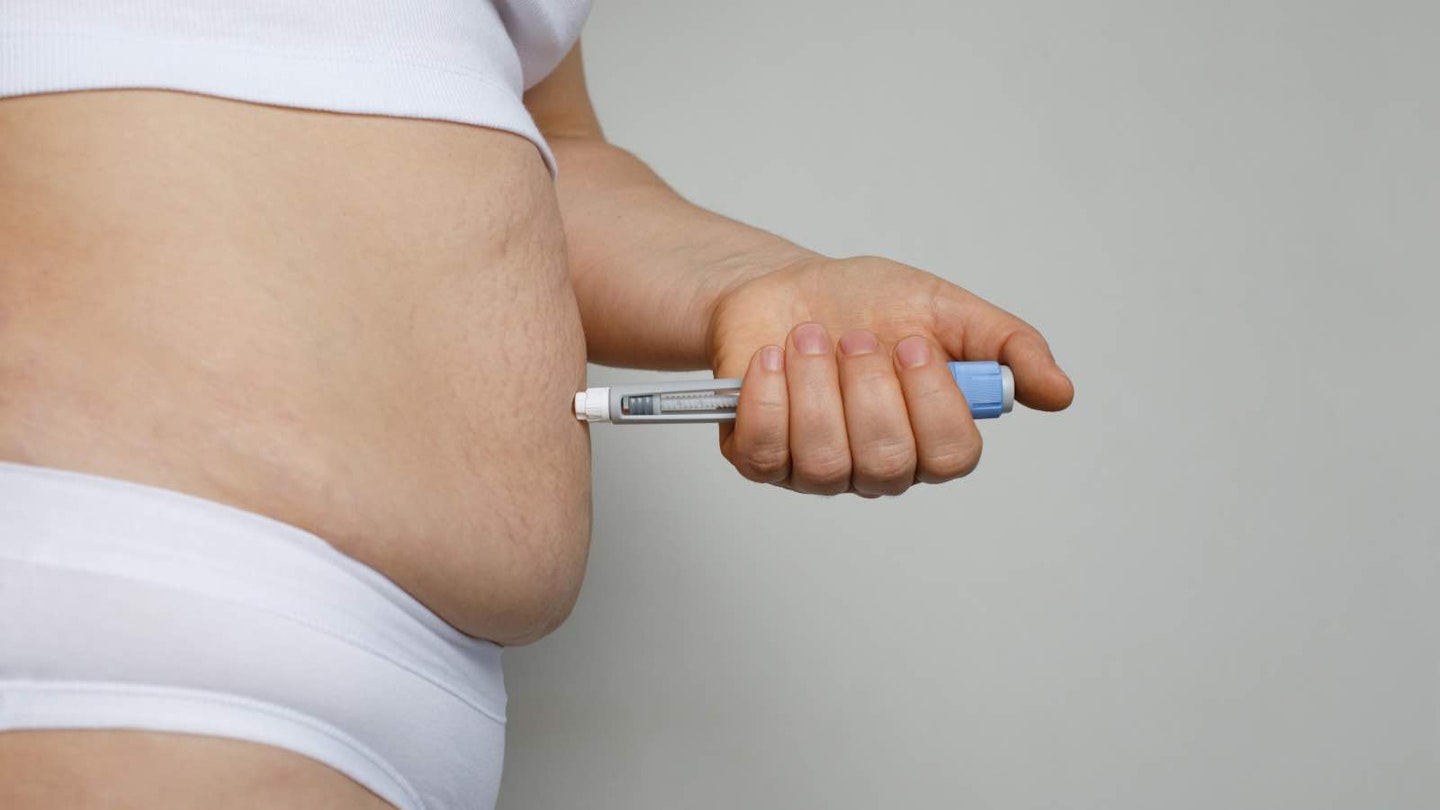Weight loss can feel like a slow, uphill battle. I should know, I've coached hundreds of women through weight loss and beyond in my years as a personal trainer and trust me when I say it's never a one size fits all solution.
Weight loss also becomes harder as we age; menopause, busy lifestyles and years of yo-yo dieting take their toll, and I've seen a lot of women experience 'diet fatigue', where they feel as though they're never going to make the progress they want. It's no surprise then, that the diet industry is a multi-billion dollar business. There's a lot of of solutions that promise quick fixes but never amount to anything, and a lot of more sustainable ideas that require a more long-term approach. These tend to be more successful.
One dieting aid that is becoming more mainstream is weight loss injections. As more and more women begin to exploring this option, questions around how they work, what to expect, and whether they’re truly safe are becoming increasingly common.
You will have seen that Mounjaro and other weight loss drugs have recently become available on the NHS, though the criteria to get them is extremely strict. This is set to relax gradually in forthcoming years but for now, it's safe to assume that the majority of people who want to use weight loss injections will have to pay for them - more on that, below.
I've taken a deep dive into one of the most popular and effective weight loss injections available - Mounjaro, including finding out who it may be suitable for, and what results and side effects you can realistically expect. I've also got expert insight from Dr David Nkamare, who works with UK Meds, to help you make an informed decision about whether this might be right for you.
One important note before we begin though: It's important to contact your GP or nurse before starting any course of weight loss treatment.
What is Mounjaro and why is everyone talking about it?
Mounjaro (tirzepatide) is a once-weekly injection that is said to be one of the most effective weight loss medications available. A recent study found that individuals taking Mounjaro lost 42% more body fat than those taking Wegovy, another well-known weight loss injection.
Mounjaro was initially developed to help manage blood sugar in people with type 2 diabetes, but it quickly gained attention for its dramatic effects on weight loss - and weight loss is one of the factors that can reverse a type 2 diabetes diagnosis, as the late Dr Michael Mosley found out for himself.
Mounjaro is now being used off-label (but still under medical supervision) to support people who are overweight or obese. It's especially useful for those who have tried traditional diet and exercise plans without long-term success.
How does Mounjaro help with weight loss?

I am currently working with a personal training client who is using Mounjaro. She described it as 'shutting out the food noise,' so the constant appeal of food that she was battling with, is gone.
Dr David Nkamare explains the science behind it: “Mounjaro helps with weight loss by increasing the action of hormones in your body that work in several ways to decrease your appetite, promote satiety and slow the emptying of food from the stomach to make you feel fuller for longer.”
In short, as my client, Elle, said, the food noise is gone. This means you’re likely to feel satisfied with less food and experience fewer cravings between meals. For many women, this can feel like a breath of fresh air. Emotional or mindless eating is exceedingly common, particularly around menopause, and just telling someone to have more willpower won't cut it.
Mounjaro works by mimicking two key hormones: GLP-1 and GIP, which play a role in regulating blood sugar and appetite. Unlike other medications that target just one of these pathways, Mounjaro activates both, which is what makes it so effective.
How much does Mounjaro cost?
The cost of Mounjaro depends on what dose you have, but it's around about £122 per month at present. It is available on the NHS, but you need to meet very strict criteria.
To be eligible you must have a BMI over 40 and at least 4 of the following:
High blood pressure
Obstructive sleep apnoea
Type 2 diabetes
Cadiovascular disease
Dyslipidaemia (abnormal fat levels in the blood)
For those paying for Mounjaro, it has recently been announced that the price of the drug is set to soar, by as much as 170%. This is in part due to demand for it, plus the NHS availability, but mostly it's because Mounjaro is already cheaper here than most EU countries, and Trump is also complaining about the cost of drug prices in the US versus Europe. The price rise will not affect NHS costs.
It is thought the prices will rise from £122 to £330 per month, though the increase will be less for smaller doses. Obviously, this is a significant cost. The £122 at present is manageable for most people, whereas £330 is a significant investment.
As a comparison, you can expect to pay around £250-£300 per month for a personal trainer who will offer fitness, lifestyle and nutrition coaching as well (depending on where you are in the country).
When will I see results with Mounjaro?
Weight loss doesn’t happen overnight, and while some people may notice changes within a few weeks, others may need more time.
I cannot stress this enough: Mounjaro is not a magic injection. It works with you, but it will not work if you continue consuming food at the rate you did. Now, most people, like my client Elle, won't have the appetite to overeat anyway, but it's worth bearing that in mind so you don't end up disappointed.
For real success, you will need to make lifestyle changes as well to support it, and that will include adding more daily movement, such as a ten minute at-home exercise routine.
"You can expect to see some weight loss changes within 1 month with the use of Mounjaro alongside a healthy diet and regular exercise,” says Dr Nkamare. “However, some people only start to see results up to 8 weeks in.”
As most personal trainers and health professionals will advise (including me), a gradual and sustainable approach to weight loss is always best. I understand that you might be wanting to see results quicker than that but please know that slow and steady always wins the weight loss race.
The key to successful weight loss with mounjaro is consistency, taking the injection at the same time each week and sticking to healthy lifestyle habits.
How do you take Mounjaro?

Mounjaro is taken as an injection once a week. You start with a low dose and gradually increase it over time. It’s recommended to take it on the same day each week, although the exact time can vary to fit your schedule.
“If a dose of Mounjaro is missed, administer a catch-up dose as soon as possible (within 4 days). If more than 4 days have passed, skip the missed dose and take the next one on your usual day,” says Dr Nkamare. And don’t worry if you feel a bit nervous about injecting yourself at first. You’re not alone:
“It is common to feel nervous about injecting yourself,” reassures Dr Nkamare. “This often improves the more you do it. You could also ask someone who knows or can be taught how to administer Mounjaro to give it to you.”
Are there any side effects with Mounjaro?
As with any medication, side effects are possible. The good news is that most are mild and often settle as your body gets used to the treatment.
Dr Nkamare says: “The most common side effects of Mounjaro are usually gastrointestinal in nature. Examples include nausea, constipation, diarrhoea, indigestion and flatulence.”
Other potential side effects include:
-
Hair loss (usually temporary and reversible)
-
Headaches
-
Dizziness
These side effects may sound unsettling, but they are typically short-lived. Taking Mounjaro with food and staying well hydrated can help minimise symptoms. My client Elle, tells me: "I've increased the dosage very gradually to avoid nasty side effects. I have had some constipation but this eased when I started exercising."
As Elle says, exercise is great for getting the bowels moving! If you're new to exercise or returning to it after a break, take a look at my expert tips on exercise for over 50's.
How long do you take Mounjaro for?
This depends on your goals and progress, and when you stop will be personal to you. Remember, Mounjaro is a tool to support long-term change.
“Mounjaro can be taken long-term for weight management,” Dr Nkamare explains. “However, it can be stopped if your goal weight has been achieved.”
If you’ve reached a healthy weight and feel confident in maintaining it with lifestyle habits, you might not want to continue taking Mounjaro. If you do decide to stop, it is crucial you do so with supervision rather than immediately stopping altogether.
What's the difference between Mounjaro and Ozempic?

Ozempic is probably the first weight loss jab you've heard of; it made the news when a lot of celebrities began using it. Although similar to Mounjaro (both help you lose weight), they are not the same, as Dr Nkmare explains:
“Ozempic is the brand name for the medication Semaglutide and Mounjaro is the brand name for the medication Tirzepatide. Though similar in their mechanisms of action, they are different medications.”
Ozempic primarily mimics the hormone GLP-1, but Mounjaro activates GLP-1 and GIP. It's this dual action that's thought to be the reason Mounjaro is more effective.
Is Mounjaro a good tool for weight loss? A personal trainer's honest opinion!
As a personal trainer, I often get asked about whatever diet or exercise regime is trending at the time. I've been asked about weight loss injections a lot in the past year and, having done extensive research and working with a client who is using Mounjaro, I have to say this:
There's a lot of noise out there about weight loss jabs being a form of 'cheating,' that someone who is using them has 'given up' or 'taken the easy way,' but that's not true.
Weight loss isn't as simple as making some lifestyle changes, breaking habits or being more disciplined, and neither is it a straightforward choice between taking medication or overhauling your diet and exercise.
Mounjaro doesn't mean no lifestyle changes are needed. What it can do, though, is level the playing field, reduce the food noise and cravings, and help you to change your life without all that added stress.
Sustainable, long-term health transformations depend on
-
Healthy food choices - a good diet for menopause is worth following if you're at that stage.
-
Regular strength training - at home, in the gym or anywhere else!
-
Cardio exercise - walking, running, cycling, swimming, the list is endless!
-
Good sleep - it's worth investing in the best mattress or best pillows you can afford.
-
Long-term lifestyle changes.
Mounjaro isn't a magic injection. It won't cancel out snacking, magically tone your tummy or banish bingo wings. But it is useful for some women. Please remember it should only be used under medical supervision and only if it's applicable to your situation. Don't misuse it in an effort to get thinner if you're already lean.
As Dr Nkmare says: “Mounjaro (tirzepatide) is an exciting step forward in weight management and beyond—offering new hope and promising outcomes for many people. While the benefits are significant, it’s essential to carefully consider your individual circumstances, potential side effects, and monitoring requirements. It is not a quick fix but rather an aid to help achieve your weight loss goals.”
Becky Fuller is a senior digital writer for Yours.co.uk. She is also a fully qualified personal trainer and strength coach, specialising in fitness and wellbeing for over 50s. Prior to joining Yours, Becky was a fitness writer for Saga, and a freelance entertainment and theatre journalist. Becky is passionate about helping people to move well and discover the many benefits of strength training.
Dr David Nkmare works with UK Meds and also in General Practice, with a strong commitment to delivering patient-centered care in both acute and primary care settings. He has interests in Dermatology, Lifestyle Medicine, and Musculoskeletal (MSK) health. He is also passionate about medical education, and promoting well-being through evidence-based lifestyle interventions.
